Brighten Up Your Videos: How to Adjust VLC Brightness Effortlessly
Adjusting the brightness of your videos can make a significant difference in your viewing experience, transforming dark, hard-to-see scenes into vibrant, clear visuals. Whether watching a movie with dimly lit scenes, enjoying a home video recorded in low light, or trying to enhance the visibility of a professionally shot video, VLC Media Player offers easy-to-use tools for brightness adjustment.
These tools allow you to fine-tune the brightness to suit your preferences, ensuring that every detail is visible and enhancing the overall enjoyment of your video content. In this comprehensive guide, we'll walk you through the simple steps to adjust VLC brightness effectively.
Part 1. How to Adjust VLC Brightness?
VLC Media Player is a versatile tool that provides a wide range of options for enhancing video playback, making it a favorite among users who seek flexibility and functionality. One such feature is the ability to adjust brightness, which can greatly enhance your viewing experience by improving your videos' visibility and overall quality.
Whether watching a movie with dark scenes, viewing footage captured in low light, or simply trying to correct a poorly lit video, VLC's brightness adjustment feature allows you to customize the playback to suit your preferences.
Step 1: Start VLC and drag the video you want to adjust into the player window. Alternatively, you can click on "Media" in the menu bar and select "Open File" to choose and play your video.
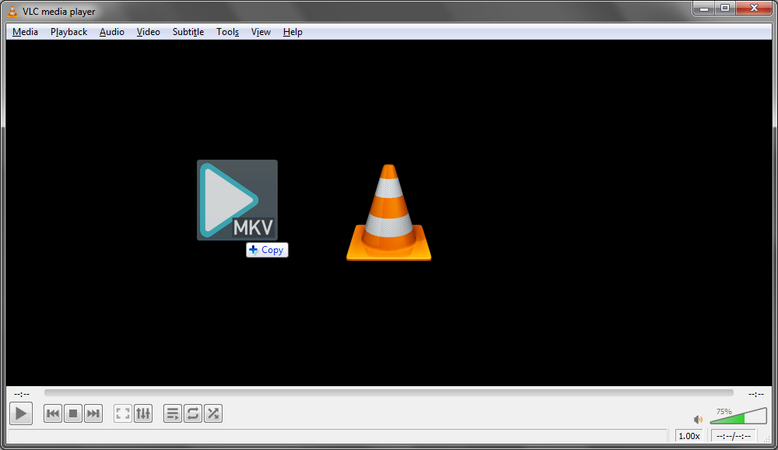
Step 2: Select "Effects and Filters" from the "Tools" menu to bring up the "Adjustments and Effects" box. You can also quickly access this window by pressing "Ctrl + E" on your keyboard.
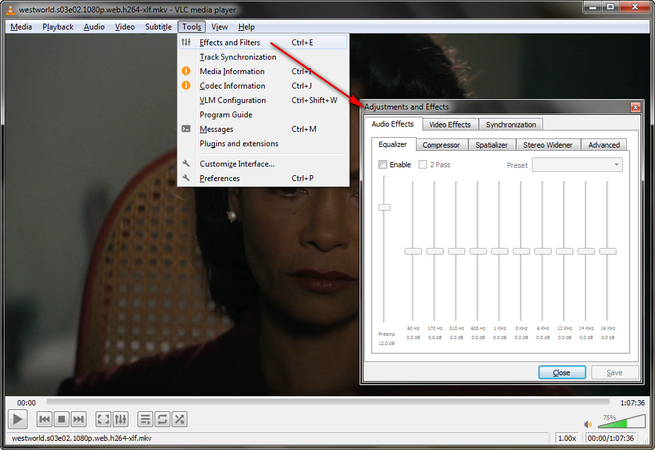
Step 3: In the "Adjustments and Effects" window, switch to the "Video Effects" tab and go to the "Essential" sub-tab. Check the box next to "Image adjust." Drag the brightness slider to increase or decrease the brightness. You can also adjust settings like Hue, Contrast, Saturation, and Gamma as needed.
Step 4: Once you're satisfied with the brightness, close the "Adjustments and Effects" window. This will apply only to the current video. If you click "Save," the changes will apply to all future videos played in VLC until you reset them. Simply closing the window ensures that the adjustments are temporary and will reset when you restart VLC.
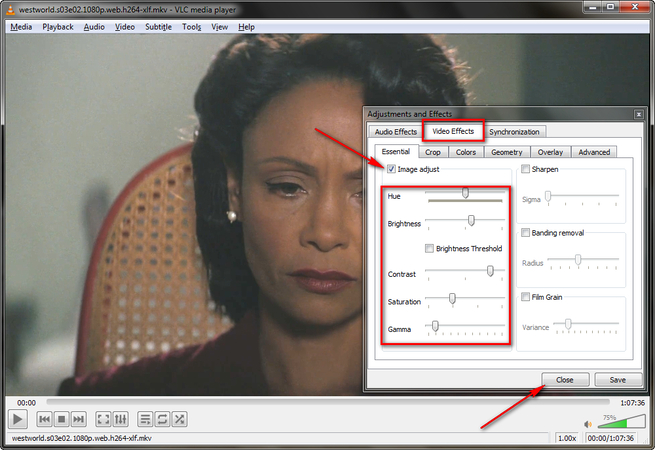
Part 2. The Best Alternative to VLC is with HitPaw Univd (HitPaw Video Converter)
While VLC Media Player is a great tool for basic video playback and simple adjustments, its somewhat limited set of features might not always meet all your video editing needs. For those seeking a more advanced and user-friendly option, HitPaw Univd is an excellent alternative catering to a wider range of video editing requirements. This versatile software offers a comprehensive suite of features beyond simple brightness adjustments, making it a robust and powerful tool for all your video editing needs.
HitPaw Univd has cutting-edge AI enhancements that automatically improve video quality, ensuring your videos look their best. Its batch-processing capability allows you to convert and edit multiple files simultaneously, saving time and effort. The software supports many formats, making it easy to work with almost any video file. Additionally, the HitPaw Univd includes advanced editing tools such as trimming, cropping, adding subtitles, and applying various effects, providing the necessary tools to create professional-quality videos.
Features
- Automatically enhance video quality with AI-powered tools.
- User-friendly interface that makes video editing accessible to everyone.
- Convert and edit multiple videos at once.
- Supports various video formats for both input and output.
- Offers tools for trimming, cropping, adding subtitles, and more.
Steps to Adjust Brightness with HitPaw Univd
Step 1: Firstly, download the software from the HitPaw website. To configure it on your device, adhere to the installation instructions. Launch the HitPaw Univd after installation.
Step 2: Launch HitPaw Univd, then click the "Add Files" button to bring in the video you wish to edit. Browse to the location of your video file, select it, and click "Open" to load it into the program. After your video is loaded, find the video thumbnail in the interface. Click the "Edit" button next to the thumbnail to access the editing tools.
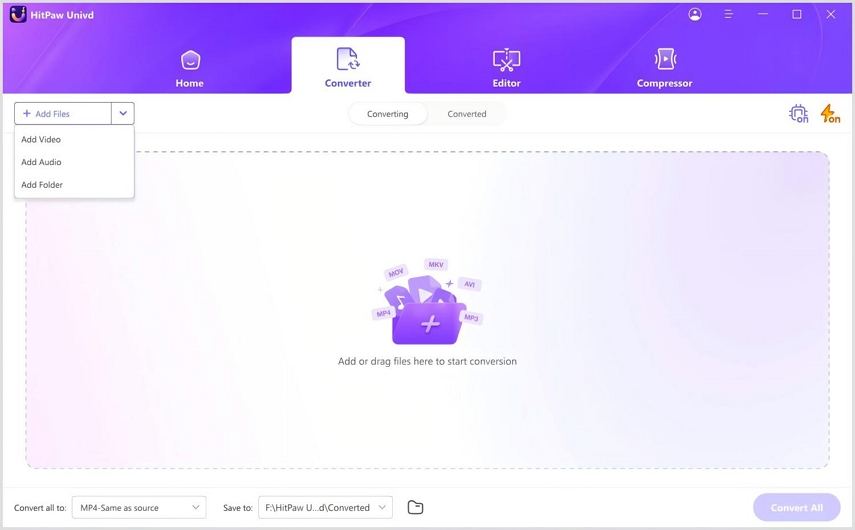
Step 3: After your video is loaded, find the video thumbnail in the interface. Click the "Edit" button next to the thumbnail to access the editing tools. In the editing window, switch to the "Adjust" tab. You'll see various sliders for adjustments, including one for brightness. Move the brightness slider to the desired level to adjust the brightness of your video.

Step 4: Once you're happy with the brightness adjustment, click "OK" to save your changes and return to the main screen. To complete the process, click the "Convert" button. Choose your preferred output format and destination, then click "Convert" to process and save the edited video.
Part 3. FAQs About VLC Brightness
Q1. Why can't I adjust the brightness in VLC?
A1.
If you're having trouble adjusting the brightness in VLC, check the "Image Adjust" option in the "Video Effects" tab. This setting is essential for enabling brightness adjustments. If this doesn't resolve the issue, it might be due to a bug or an outdated version of VLC.
Try updating VLC to the latest version, as newer versions often include bug fixes and improvements that might resolve this problem. Additionally, ensure that your video drivers are up-to-date, as outdated drivers can sometimes cause issues with video playback and adjustments. If the problem persists, consider reinstalling VLC to reset all settings.
Q2. Does adjusting brightness in VLC affect the original video file?
A2.
No, adjusting the brightness in VLC does not affect the original video file. The brightness adjustment in VLC only affects the playback and is applied in real-time as the video is viewed. This means that the changes you make to the brightness, contrast, hue, or other settings are temporary and only apply while watching the video in VLC.
The original video file remains unchanged and will retain its original settings when played by other media players or transferred to other devices. If you need permanent changes to the video file, you would need to use video editing software to re-encode the file with the desired adjustments.
Conclusion
Adjusting VLC Media Player brightness is a straightforward process that can significantly enhance your viewing experience. However, for those seeking more advanced editing capabilities and a broader range of features, HitPaw Univd offers a robust alternative.
This versatile software allows for brightness adjustments and offers AI-powered video enhancement tools, batch processing capabilities, and support for a wide array of video formats. Whether aiming to improve video quality with sophisticated AI tools or need to convert multiple videos in bulk efficiently, HitPaw Univd provides a seamless and powerful editing experience.






 HitPaw Edimakor
HitPaw Edimakor HitPaw VikPea (Video Enhancer)
HitPaw VikPea (Video Enhancer)

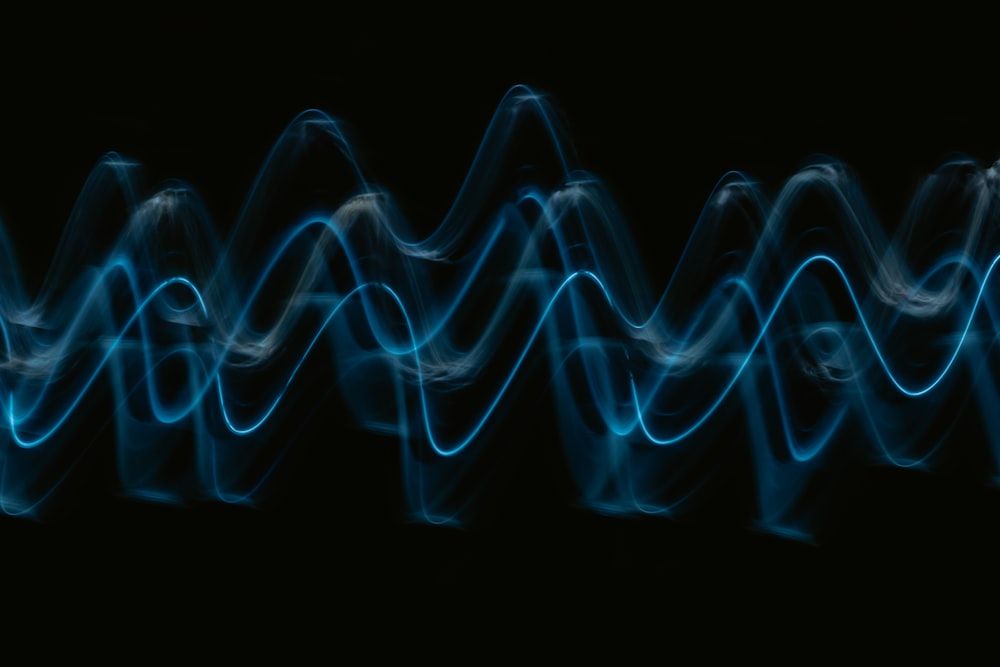

Share this article:
Select the product rating:
Joshua Hill
Editor-in-Chief
I have been working as a freelancer for more than five years. It always impresses me when I find new things and the latest knowledge. I think life is boundless but I know no bounds.
View all ArticlesLeave a Comment
Create your review for HitPaw articles